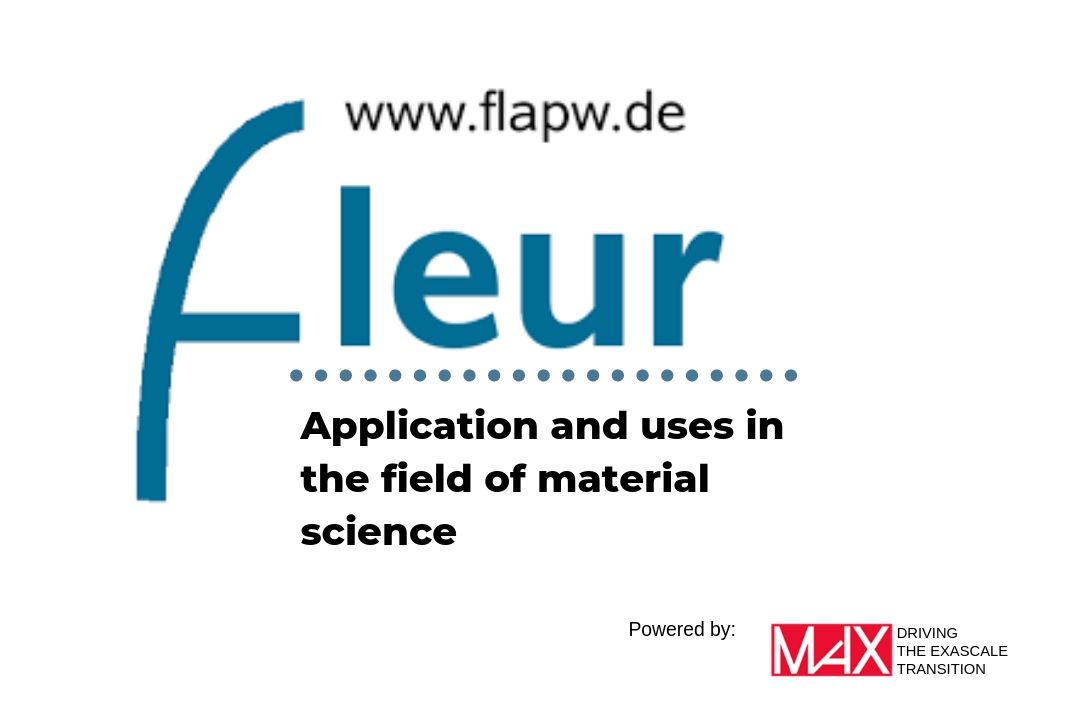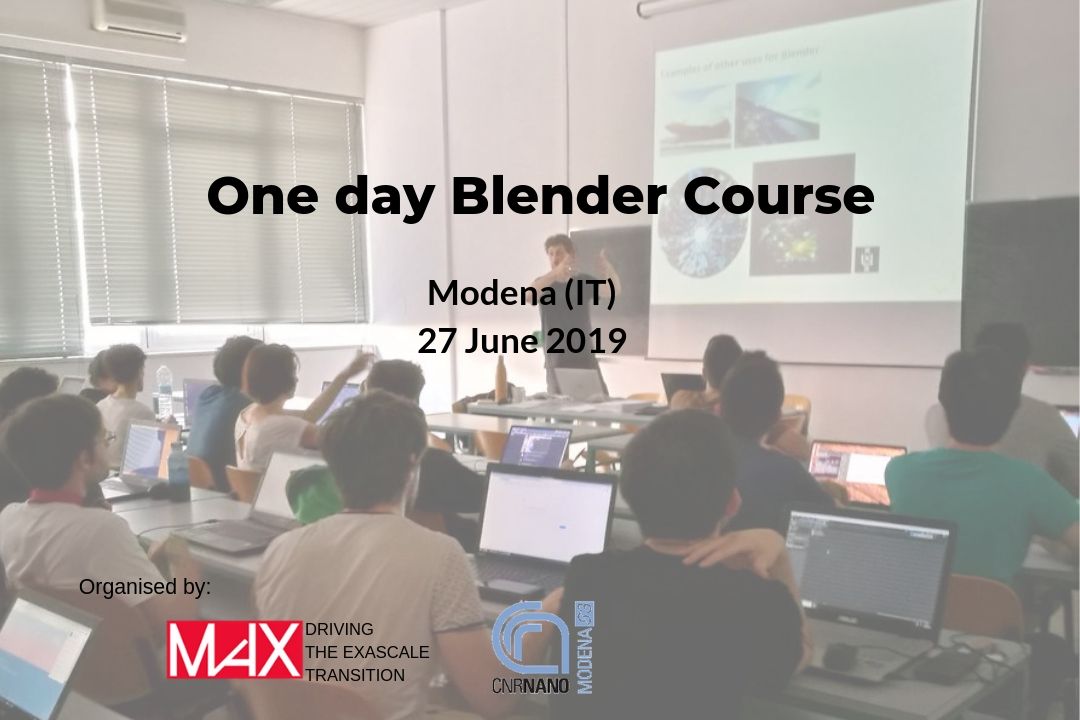MaX European Centre of Excellence (CoE): Leading the path to materials design and beyond Exascale in Europe
As we enter into our six month of activity MaX - “MAterials design at the eXascale. European Centre of Excellence in materials modelling, simulations, and design”, supported by the European Union’s Horizon 2020 project and funded under the H2020-INFRAEDI-2018 call, we are making progress in the field of pre-exascale and exascale computers expected in Europe in the 2020s to meet the demands from a large and growing base of researchers committed to materials discovery and design.
The growing challenges that lie ahead for the fourteen-partner-strong consortia lie in the co-design activities to ensure that future HPC architectures are well suited for materials domain applications and vice-versa. The project, through its ambitious work plan, looks to widen the access to codes, provide workflows and turn-key solutions to empower user communities in materials simulations. This second phase fosters the engagement and know-how of users communicating in industry and academia. Moreover, the second phase has added members to the original consortia, key players in open source community codes and Tier-0 supercomputing centres, complementing the partnership with strengthened technology and training components.
Prof. Elisa Molinari, MaX Director at CNR Nano at Modena in Italy, the Coordinator also of the second phase going forward enthusiastically highlights that:
”The MAX Centre of Excellence will pave the way for the transition to and beyond exascale technologies by bringing the most successful and the most widely used open-source, community codes in quantum simulations of materials to the exascale and by adopting a sustainable software development strategy to deal with the sudden technological disruptions to be expected in the coming years.”
This strategy will allow building capacity, competence and services that can be transitioned to large and small enterprises, and to other research and academic communities, fostering the entire HPC ecosystem in Europe and reducing the costs and barriers preventing its full exploitation. The achievement of the main goal will be carried out by implementing four key-actions:
- Restructure MAX flagship codes towards exascale and extreme scaling performance, in order to address frontier scientific, industrial or societal challenges.
- Co-design activities to ensure that future HPC architectures are well-suited for the applications and their users, providing them with high performance and scalable application base.
- Develop a broader ecosystem enabling the convergence of HPC, HTC and HPDA.
- Widen the access to codes and foster transfer of know-how to user communities.
Over the following months MAX CoE will build on the successful experience, synergy, and community of the Centre established in the previous initiative (funded under H2020 EINFRA-5-2015) which focused on the following results and gravitated around three paramount goals:
- Enabling the transition of materials’ codes to exascale;
- The convergence of HPC, HTC and HPDA;
- Transition to the pivotal role of co-design in hardware and software.
The successful deployment and evolution of the most widely used open-source, community codes, on the pre-exascale machines expected by the end of the project, and to prepare them for the transition to exascale. MaX is committed to collaborating with the Coordination and Support Action, FocusCoE CSA, EOSC, EuroHPC and Graphene to complement MAX vertical domain-specific activities with transversal initiatives aimed at maximising the exploitation of the CoE results and reaching a critical mass on subjects such as industrial outreach (especially towards SMEs), where individual CoE activities may be less effective.
MaX involvement on 1st HPC CoE Assembly
On the 21st February 2019 in Frankfurt, MaX sat in prime position, together with all European HPC CoEs, as they came together on the 1st EU HPC CoE General Assembly (GA) to discuss cross-community collaboration, common training activities and concerted outreach to support industry. The General Assembly will allow EU HPC CoEs to collaboratively define a strategy for contributions to the EU HPC Ecosystem and plan its implementation.
The following are the main mutual objectives defined during the GA:
- Create a platform to allow HPC CoEs to collectively define an overriding strategy (EU HPC Federal Assembly)
- Support HPC CoEs to achieve enhanced intersection with industry/SMEs
- Concerted action on the training
- To promote the set of European CoEs
MaX and synergies with the European Open Science Cloud (EOSC)
MaX, in the context of the European Open Science Cloud- EOSC (the European Commission initiative that looks to reinforce Open Science, Open Innovation and Open to the world policies), is looking to synergise with the developments taking place on EOSC in these months, as currently the project offers simulation data and services, in the true spirit of open science, by allowing to run open-source simulation codes on the cloud, supercomputing centres, and local resources (deploying virtual machines).
MaX is one of the High-Performance Computing Centers of Excellence that was invited, on the second edition of the EOSC-hub Week that was held on 10-12 April 2019 at the Vienna House Diplomat in Prague, Czech Republic, to showcase how MaX is seamlessly integrating with EOSC and how Aiida and Materials Cloud tools are paving the way of the new computational materials science and to grant streamlined access to HPC.
Giovanni Pizzi from École polytechnique fédérale de Lausanne (EPFL), one of the MaX partner, presented MaX in the EOSC event. He introduced the “Pathways for EOSC-hub and MaX collaboration” on the 11th of April panel.
This event brought together both present and future service providers and users of the European Open Science Cloud. It also provided the opportunity to explore the collaboration between EOSC and HPC CoEs and sought to understand the synergies and the complementarities on which both EOSC-Hub and the HPC CoEs can capitalise on for mutual benefit to how EOSC-hub can further support HPC CoEs activities.
Collaboration with the HPC community at the EuroHPC Summit Week 2019 (13/17 May, Poznan)
One of the most popular opportunities to learn more and to establish a solid network with like-minded individuals working in materials science is certainly at the fourth edition of the EuroHPC Summit Week 2019, held in Poznan, Poland from 13th until 17th May 2019. This event gathered all relevant European HPC stakeholders, from technology suppliers and HPC infrastructures to scientific and industrial HPC users in Europe.
The EuroHPC Summit Week 2019 provides a great opportunity to network with all relevant European HPC stakeholders, from technology suppliers and HPC infrastructures to scientific and industrial HPC users in Europe.
MaX joined the event, represented by the Elisa Molinari, MaX coordinator, together with other partners such as Carlo Cavazzoni (CINECA) and Dirk Pleiter (Juelich) who provided a talk on the “Co‐Design Workshop” session about the challenges on applications and technical requirements for the exascale era. Besides, Sebastiaan Philippe Huber from EPFL showcased MaX’s outcomes in the “1st European Communities Workshop on Exascale Computing Focus on High-Performance Data Analytics” together with the eight (8) other CoEs.
Visit our web pages and Join the MaX community at max-centre.eu
Follow us on our Social media channels:
- Twitter: @max-center2
- LinkedIn: company/max-centre/
- Youtube: youtube/channel/MaX Centre eXascale



